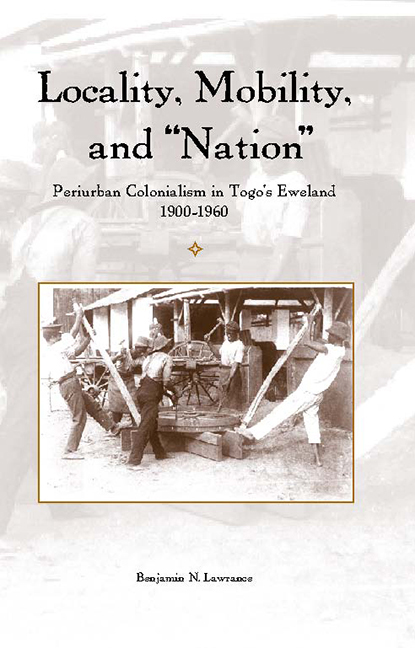Book contents
- Frontmatter
- Dedication
- Contents
- List of Illustrations
- Preface
- Notes on Orthography
- Map
- Introduction: Conceptualizing Periurban Colonialism in Sub-Saharan Africa
- 1 Mobility, Locality, and Ewe Identity in Periurban Eweland
- 2 Intervention and Dissent: Manufacturing the Model Periurban Chief
- 3 Crisis in an Ewe “Capital”: The Periurban Zone Descends on t he City
- 4 Vodou and Resistance: Politico-Religious Crises in t he Periurban Landscape
- 5 The German Togo-Bund and the Periurban Manifestations of “Nation”
- 6 From Eweland to la République Togolaise: Le Guide du Togo and the Periurban Circulation of Knowledge
- Epilogue
- Notes
- Bibliography
- Index
1 - Mobility, Locality, and Ewe Identity in Periurban Eweland
Published online by Cambridge University Press: 11 May 2017
- Frontmatter
- Dedication
- Contents
- List of Illustrations
- Preface
- Notes on Orthography
- Map
- Introduction: Conceptualizing Periurban Colonialism in Sub-Saharan Africa
- 1 Mobility, Locality, and Ewe Identity in Periurban Eweland
- 2 Intervention and Dissent: Manufacturing the Model Periurban Chief
- 3 Crisis in an Ewe “Capital”: The Periurban Zone Descends on t he City
- 4 Vodou and Resistance: Politico-Religious Crises in t he Periurban Landscape
- 5 The German Togo-Bund and the Periurban Manifestations of “Nation”
- 6 From Eweland to la République Togolaise: Le Guide du Togo and the Periurban Circulation of Knowledge
- Epilogue
- Notes
- Bibliography
- Index
Summary
On the boundary between urban and rural, modern and backward, in the places of confrontation, and in the positions occupied by outsiders and intermediaries—there the new gospel of participation and innovation was most warmly received.
—Lynn Hunt, Politics, Culture, and Class, 211In 1925, Governor Auguste Bonnecarrère's administration promulgated a law mandating that markets in Eweland conform to a new twice-weekly, three-day cycle accompanied by a day of rest on Sunday. The law abolished the four-day cycle operating throughout Eweland, and fixed particular days of the new seven-day week as market days in various dukøwo throughout Eweland. The new law was designed to amplify the role of Lomé as a market town and the central node of a market zone. Bonnecarrère sought to curtail the sprawling periurban markets and redirect commerce from the outlying periurban region through the capital. He also sought to manage competition. Without explicitly stating it, the new law was also designed to facilitate the taxation of periurban markets and commerce along the international border. Smuggling and unregulated trade imperiled colonial authority both financially and politically. Furthermore, because such monitoring and restructuring required the physical presence of French officials, this new seven-day cycle was designed to harmonize their work schedule. For a short while, the law was grudgingly tolerated. Market women substantially reorganized their lives, families, and livelihoods. More goods flowed through the city, only to be carried back to outlying market towns on subsequent market days.
This chapter explores how periurban Eweland came into being by following key shifts in lives and communities from the period prior to formal colonialism until the creation of the League of Nations mandates.
Regulating Periurban Markets
Bonnecarrère's attempt to regulate the market shows how significant the periurban zone was by the mid-1920s. But periurban Eweland did not simply come into being overnight. Markets and market cycles have a rich history in West Africa. The order and tradition of regional market networks follow time-honored patterns, and their uneasy coexistence with the Western seven-day week in the colonial and postcolonial period is suggestive of the depth and importance of these patterns. Eweland and neighboring areas, such as the Adangme, Fon, and Akposso regions, have long had four-day cycles.
- Type
- Chapter
- Information
- Locality, Mobility, and "Nation"Periurban Colonialism in Togo's Eweland, 1900–1960, pp. 21 - 44Publisher: Boydell & BrewerPrint publication year: 2007

